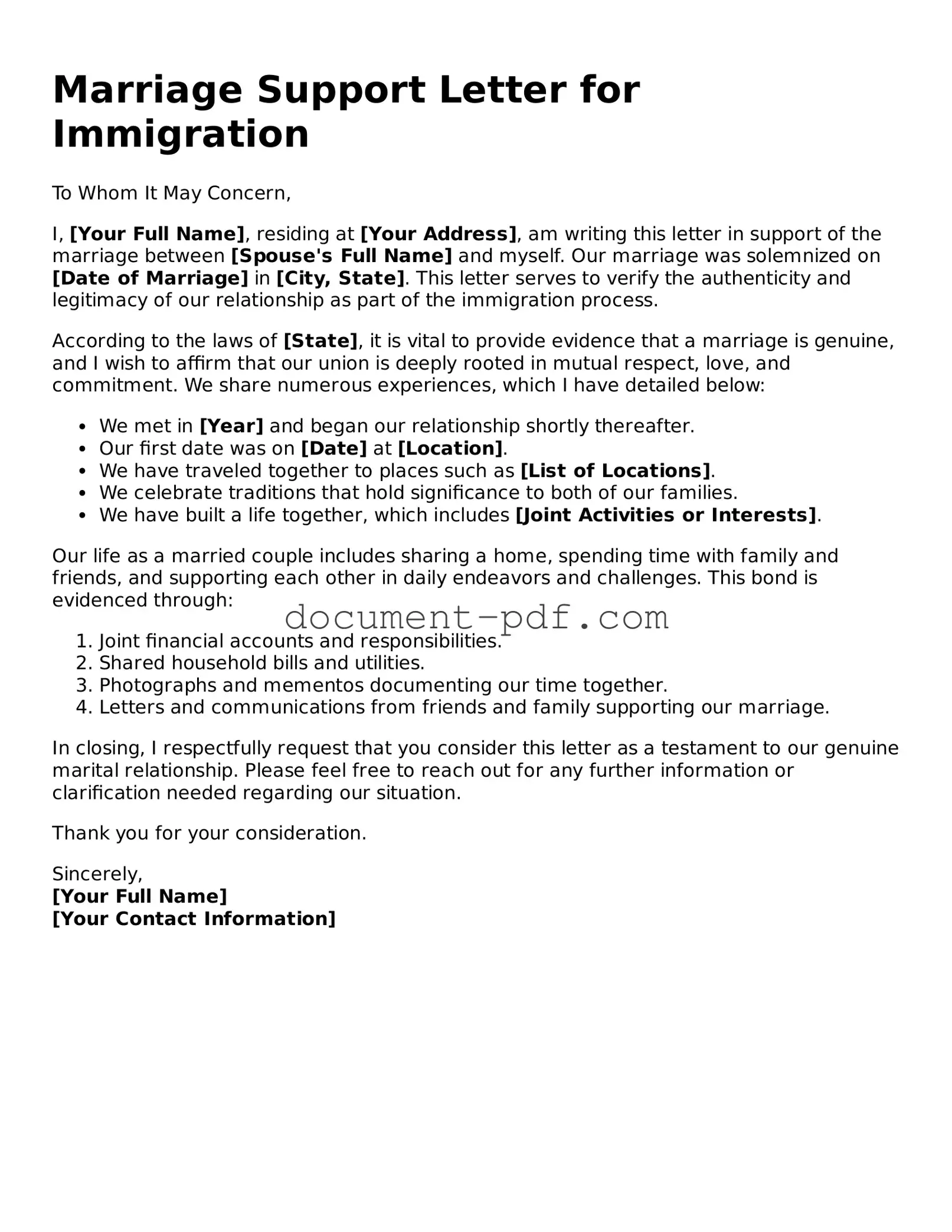The Affidavit of Support is a document that a sponsor files to demonstrate financial capability to support an immigrant. This document is often required in immigration cases to ensure that the immigrant will not become a public charge. Similar to the Marriage Support Letter, it provides evidence of a genuine relationship, but it focuses more on the financial aspects of the sponsorship rather than the emotional or relational components.
The I-130 Petition for Alien Relative is another important document in the immigration process. It is filed by a U.S. citizen or lawful permanent resident to establish a relationship with a foreign relative who wishes to immigrate. Like the Marriage Support Letter, it aims to prove the legitimacy of the relationship, but it does so through official channels and requires specific evidence of the relationship, such as marriage certificates or photographs.
The I-485 Application to Register Permanent Residence or Adjust Status is a form used by individuals in the U.S. to apply for permanent residency. This document may include a Marriage Support Letter as part of the evidence submitted. Both documents serve to support the applicant's case by demonstrating the authenticity of the marital relationship, although the I-485 focuses on the legal process of adjusting immigration status.
The Form G-325A, Biographic Information, collects personal information about the applicant and their spouse. While it does not serve the same purpose as the Marriage Support Letter, it complements the application by providing background details that help establish the identity and history of the individuals involved. Both documents contribute to a complete understanding of the relationship in question.
The I-864W, Intending Immigrant’s Affidavit of Support Exemption, is for certain immigrants who do not need a sponsor. This document is similar in that it relates to financial support and immigration status. While the Marriage Support Letter emphasizes the relationship, the I-864W focuses on the financial independence of the immigrant, showcasing different aspects of the immigration process.
The N-400 Application for Naturalization is the form used by immigrants to apply for U.S. citizenship. It requires proof of a genuine marriage if the applicant is applying based on marriage to a U.S. citizen. The Marriage Support Letter may be included to support claims of a legitimate marriage, demonstrating that both documents are integral to the citizenship process.
The Form I-751, Petition to Remove Conditions on Residence, is filed by conditional residents who obtained their status through marriage. It requires evidence that the marriage is genuine. The Marriage Support Letter serves a similar purpose by providing additional support to verify the authenticity of the relationship, although the I-751 is specifically focused on removing conditions from residency status.
A Recommendation Letter Form is essential for articulating an individual's qualifications and suitability for various opportunities, and in many instances, resources like UsaLawDocs.com can provide valuable guidance in crafting such letters effectively. These forms are crucial in academic settings, job applications, and professional scenarios, as the presence of a well-structured recommendation letter can greatly influence the outcome of a candidate's prospects.
The Form I-864P, Poverty Guidelines, outlines the income requirements for sponsors. While it does not directly relate to the relationship aspect, it is a crucial part of the immigration process. Both the Marriage Support Letter and the I-864P serve to ensure that the immigrant will be supported, albeit from different perspectives—one from a relational standpoint and the other from a financial one.
The Form I-90, Application to Replace Permanent Resident Card, is used by permanent residents to renew or replace their green cards. If the card was obtained through marriage, a Marriage Support Letter may be included to reaffirm the legitimacy of the marriage. Both documents are part of maintaining lawful permanent residency, emphasizing the ongoing nature of the relationship.

